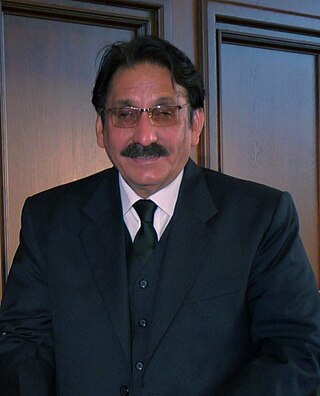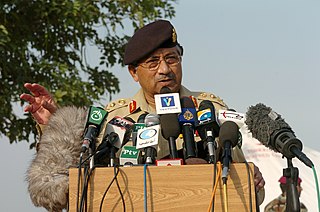
The Politics of Pakistan takes place within the framework established by the constitution. The country is a federal parliamentary republic in which provincial governments enjoy a high degree of autonomy and residuary powers. Executive power is vested with the national cabinet which is headed by Prime Minister of Pakistan, who works with the bicameral parliament and the judiciary. Stipulations set by the constitution provide a delicate check and balance of sharing powers between executive, legislative, and judicial branches of the government.

The Courts of Denmark is the ordinary court system of the Kingdom of Denmark. The Courts of Denmark as an organizational entity was created with the Police and Judiciary Reform Act taking effect 1 January 2007 which also significantly reformed the court system e.g. by removing original jurisdiction from the High Courts and by introducing a new jury system.

The Supreme Court of Pakistan is the apex court in the judicial hierarchy of the Islamic Republic of Pakistan.

The chief justice of Pakistan is the chief judge of the Supreme Court of Pakistan and is the highest-ranking officer of the Pakistani judiciary. The officeholder is the senior most of 17 justices of the Supreme Court of Pakistan.

Iftikhar Muhammad Chaudhry is a Pakistani jurist who served as the 20th Chief Justice of Pakistan over three non-consecutive terms from 29 June 2005 to 11 December 2013.

The High Court of Singapore is the lower division of the Supreme Court of Singapore, the upper division being the Court of Appeal. The High Court consists of the chief justice and the judges of the High Court. Judicial Commissioners are often appointed to assist with the Court's caseload. There are two specialist commercial courts, the Admiralty Court and the Intellectual Property Court, and a number of judges are designated to hear arbitration-related matters. In 2015, the Singapore International Commercial Court was established as part of the Supreme Court of Singapore, and is a division of the High Court. The other divisions of the high court are the General Division, the Appellate Division, and the Family Division. The seat of the High Court is the Supreme Court Building.

The Court of Appeal of Singapore is the highest court in the judicial system of Singapore. It is the upper division of the Supreme Court of Singapore, the lower being the High Court. The Court of Appeal consists of the chief justice, who is the president of the Court, and the judges of the Court of Appeal. The chief justice may ask judges of the High Court to sit as members of the Court of Appeal to hear particular cases. The seat of the Court of Appeal is the Supreme Court Building.

The 1999 military takeover in Pakistan was a bloodless coup d'état initiated by the military staff at the Joint Staff HQ working under the Chairman of the Joint Chiefs of Staff Committee and Chief of Army Staff General Pervez Musharraf. The instigators seized control of the civilian government of the popularly elected Prime Minister Nawaz Sharif on 12 October 1999. On 14 October, General Musharraf, acting as the country's Chief Executive, issued a controversial provisional order that suspended the Constitution of Pakistan.

In most legal jurisdictions, a supreme court, also known as a court of last resort, apex court, and highcourt of appeal, is the highest court within the hierarchy of courts. Broadly speaking, the decisions of a supreme court are binding on all other courts in a nation and are not subject to further review by any other court. Supreme courts typically function primarily as appellate courts, hearing appeals from decisions of lower trial courts, or from intermediate-level appellate courts. A Supreme Court can also, in certain circumstances, act as a court of original jurisdiction, however, this is typically limited to constitutional law.

The judiciary of Pakistan is the national system of courts that maintains the law and order in the Islamic Republic of Pakistan. Pakistan uses a common law system, which was introduced during the colonial era, influenced by local medieval judicial systems based on religious and cultural practices. The Constitution of Pakistan lays down the fundamentals and working of the Pakistani judiciary.

Chief Justice of Pakistan Iftikhar Muhammad Chaudhry was made a "non-functional Chief Justice" on 9 March 2007. In so acting, President Pervez Musharraf invoked two main clauses of the Constitution of Pakistan. The suspension evoked a nationwide popular mass protest movement led by lawyers, known as the Lawyers' Movement and eventually culminated with the Pakistan Long March.

Athar Minallah is a Pakistani lawyer, and jurist who is serving as a judge of Supreme Court of Pakistan since 11 November 2022. Before his appointment to the Supreme Court of Pakistan, he was a judge of the Islamabad High Court for 8 years, and also served as its 5th Chief Justice from 28 November 2018 to 10 November 2022.
Qazi Faez Isa is a Pakistani jurist who is currently serving as the 29th Chief Justice of Pakistan (CJP) since 17 September 2023. He was appointed as a justice of the Supreme Court in 2014, having previously served as the chief justice of Balochistan High Court from 2009 to 2014.

The Judiciary of Sierra Leone is the branch of the Government of the Republic of Sierra Leone which interprets and applies the laws of Sierra Leone to ensure impartial justice under law and to provide a mechanism for dispute resolution. The independence of the judiciary is guaranteed by the constitution.
Umar Ata Bandial is a Pakistani jurist who served as the 28th Chief Justice of Pakistan from February 2022 to September 2023. He was appointed as the Chief Justice after the approval by President Arif Alvi on 13 January 2022, after which he assumed his office on 2 February 2022 and retired on 16 September 2023.
Ijazul Ahsan is a Pakistani jurist who served as a justice of the Supreme Court of Pakistan from 28 June 2016 to 11 January 2024. He resigned on 11 January 2024 following the resignation of Mazahar Ali Akbar Naqvi, without citing a reason. It has long been rumored that a misconduct reference before the Supreme Judicial Council of Pakistan was about to be filed against Ijaz, fearing proceedings, he resigned and ran away.
Sayyed Muhammad Mazahar Ali Akbar Naqvi is a removed Justice of the Supreme Court of Pakistan, he assumed office on 16 March 2020 and was removed as a Judge on 10 January 2024. Naqvi previously served as a Judge of the Lahore High Court before his out of turn elevation to the Supreme Court.
The Federation of Pakistan v. General (R) Pervez Musharraf, informally known as the Musharraf high treason case, was a court case, in which General Pervez Musharraf who acted in the capacity as chief of army staff, tried for high treason stemming from his imposing of unconstitutional state of emergency on 3 November 2007. In this act, Gen. Musharraf, who was also elected as President of Pakistan, subverted and suspended the writ of the Constitution of Pakistan, dismissing the fifteen justices of the Supreme Court of Pakistan and the fifty-six judges of the provincial High Courts while issuing arrest orders to Chief Justice of Pakistan.

Jawwad S. Khawaja v. Federation of Pakistan, PLD 2024 SC 337, is a landmark decision by the Supreme Court of Pakistan in which it was held that the Constitution of Pakistan does not allow for the court-martial of civilians.












